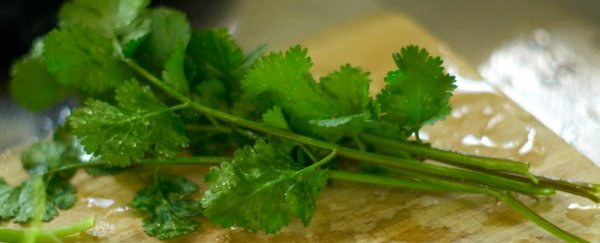When it comes to food, there are few items so divisive as coriander - or cilantro, as it's called in North and Central America. Some people love its fresh flavour, while others swear it tastes like soap. And it turns out a genetic variant that affects how we process aromas might at least partially explain the difference in opinion.
Back in 2012, genetic testing company 23andMe surveyed the DNA of nearly 30,000 people of European background, who'd answered a survey about whether they loved or hated coriander. Out of the 11,851 participants who declared that they liked coriander and the 14,604 who insisted it tasted like soap, they found two genetic variants that were associated with the preferences, and the strongest variant was located within a cluster of known olfactory-receptor genes.
"These results confirm that there is a genetic component to cilantro taste perception and suggest that cilantro dislike may stem from genetic variants in olfactory receptors," the authors published in Arxiv, after conducting a follow-up study to confirm their results.
So how do genes play a role in what you do and don't like to eat?
As the 23andMe team, which was led by geneticist Nicholas Eriksson, explained over on their blog, it has a lot to do with how your body processes flavour and aroma compounds. And for coriander, the main compounds involved are called aldehydes:
"The same chemical can be found in both appealing and unappealing places - cheese and body odour, for example. Conversely, the same ingredient - such as cilantro - can contain both pleasant and unpleasant chemicals. Whether stinky cheese and cilantro are delicious or disgusting depends on your particular perception of many different chemicals.
Cilantro's aromatic qualities primarily depend on a group of compounds known as aldehydes. One type of aldehyde has been described as being 'fruity' and 'green' and another type as being 'soapy' and 'pungent'. One of the eight genes near the SNP we identified codes for a receptor called OR6A2, which is known to detect aldehydes such as those found in cilantro."
But their research also suggests that our environment can play a big role in taste too, because only around 10 percent of coriander preference could be explained by the genetic variants. Which means that some people who are genetically predisposed to hate the smell of the herb may grow to enjoy it after years of exposure. "It is possible that the heritability of cilantro preference is just rather low," the authors write.
Either way, you now have a great excuse for your irrational hatred of a totally innocent herb thanks to science. You're welcome.
